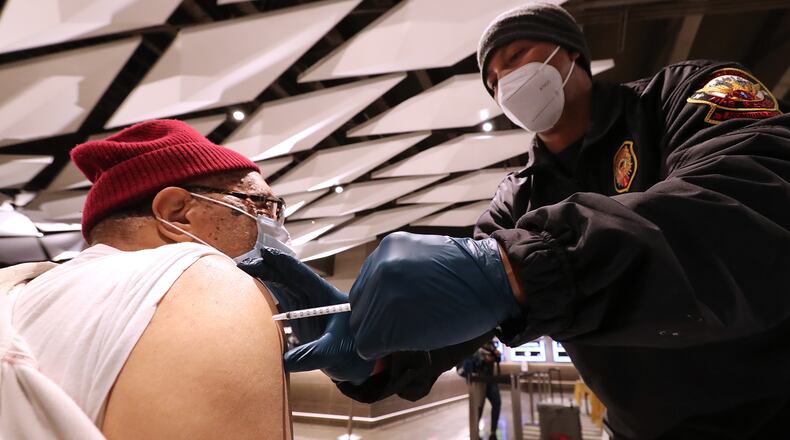Never has the over-used jargon “public-private partnership” felt more tangible than during the last 14 months.
In metro Atlanta, sports venues built with the help of public money have been used to solve the greatest challenges of the day: accommodating record numbers of voters, and getting people tested or vaccinated for COVID-19.
But tax watchdogs say the corporate generosity is only part good stewardship. It’s also good public relations.
Devoid of screaming face-painted fans for months, Mercedes-Benz Stadium hosted half of the vaccinations administered by the Fulton County government as of Feb. 1. They also opened for early voting during Georgia’s general and runoff elections.
The stadium’s owners will receive, based on current projections, between $700 million and $900 million of Atlanta’s hotel-motel sales tax funds over 30 years.
State Farm Arena, home of the Atlanta Hawks, saw more than 40,000 voters during the presidential election. The city agreed in 2016 to fund $142.5 million of the arena’s $192.5 renovation.
“It was very good public relations, there must have been some ... not inconsiderable cost to them,” said Julian Bene, a government finance watchdog who was often lone naysayer against tax incentives offered to businesses during his eight years on the Invest Atlanta board.
But, Bene said: “I don’t think anyone would pretend this is reasonable payback of what we’ve given to these facilities.”
Those who run these taxpayer-assisted venues were mostly non-committal about the costs incurred by opening their doors for public good. But, they say, it is likely to happen more in the future.
“These public-private partnerships, they’re just in their infancy,” Hawks’ CEO Steve Koonin said.
‘A consciousness’
The public portion of public-private partnerships is typically money — either taxpayer money spent on debt to build a venue, or tax dollars foregone to lure a business to an area.
Politicians typically cite the creation of new jobs, investments made in the surrounding community as a result of the project, or new streams of tax revenue that wouldn’t otherwise exist as reasons to partner up with for-profit businesses.
Fulton County Commission Chairman Robb Pitts said the private sector helping the public during crisis isn’t new.
“In times of need, the private sector has always stepped up to help, and this is a classic example of the way things used to be,” said Fulton County Commission Chairman Robb Pitts.
This particular crisis helped create the needed space, as the pandemic wiped out most or all sports seasons. The 680,000 square feet at State Farm Arena was available for voting because it sat empty for months after the NBA season was suspended last year.
“There wouldn’t have been building availability,” but for the pandemic, Koonin said. “Then when everything went dark, it creates a consciousness.”
Koonin said he had the idea to offer the arena right after demonstrators posted up outside their doors to protest police violence against black people — days before Fulton’s disastrous June primary election in which thousands of people waited in lines for hours to cast their ballots.
“We knocked down every hurdle: security, parking, rapid transit access, social distancing space, trained employees, the ability to feed people,” he said. “I think the assets will continued to be deployed, I just don’t know the when and where.”
Pitts said the Hawks and Falcons fueled a national movement. Most NBA arenas assisted voting, and NFL Commissioner Roger Goodell has offered all stadiums as vaccination sites.
Credit: Alyssa Pointer / Alyssa.Pointer@ajc.com
Credit: Alyssa Pointer / Alyssa.Pointer@ajc.com
Cannon told The Atlanta Journal-Constitution they are working with the state to make the stadium a mass vaccination site once supply steadies.
“What we’re doing now is working together to run through all the obstacles that might stand in the way of drastically adding capacity,” he said.
Mercedes-Benz Stadium and State Farm Arena received national praise for offering up their spaces. Cannon and Koonin declined to say how much it cost them.
“We were able to recalibrate that asset and turn that into that engine for the community,” Cannon said.
Koonin compared it to the relationship between SpaceX and NASA: “There are certain things that private organizations can do better than volunteer organizations.”
Bene said he was vaccinated at Mercedes-Benz Stadium.
“Let’s not be Pollyannaish ... we did hand over a lot of tax dollars that could have gone to other uses,” Bene said.
Braves eager to play a role
Not all sports stadiums bearing Atlanta’s name have done the same.
Neither the Braves stadium or the team’s 1.5 million-square-foot mixed-use development in Cobb County hosted voting, vaccinations or testing. Truist Park was built with more than $400 million in public money.
Cobb spokesman Ross Cavitt said the Braves post-season run made it impossible to host early voting in October.
And Braves spokeswoman Beth Marshall said team has offered the ballpark and parking lots as a testing or vaccination site for several months.
She said two weeks ago they were “hopeful to receive authorization soon.” She added: “The Braves are eager to play a role in helping our community get past the COVID-19 pandemic.”
The open question is whether venue owners will see future public challenges as large enough to help like this again.
When asked if they would host voting again, Koonin said: “In the future, all these buildings and all these assets have to be considered for large national events.”
Cannon agreed: “100% we would do that. In the future, we got to balance that we do 50 to 60 large events. We’ve got to conduct our business.”
Credit: WSBTV Videos
About the Author
Keep Reading
The Latest
Featured





